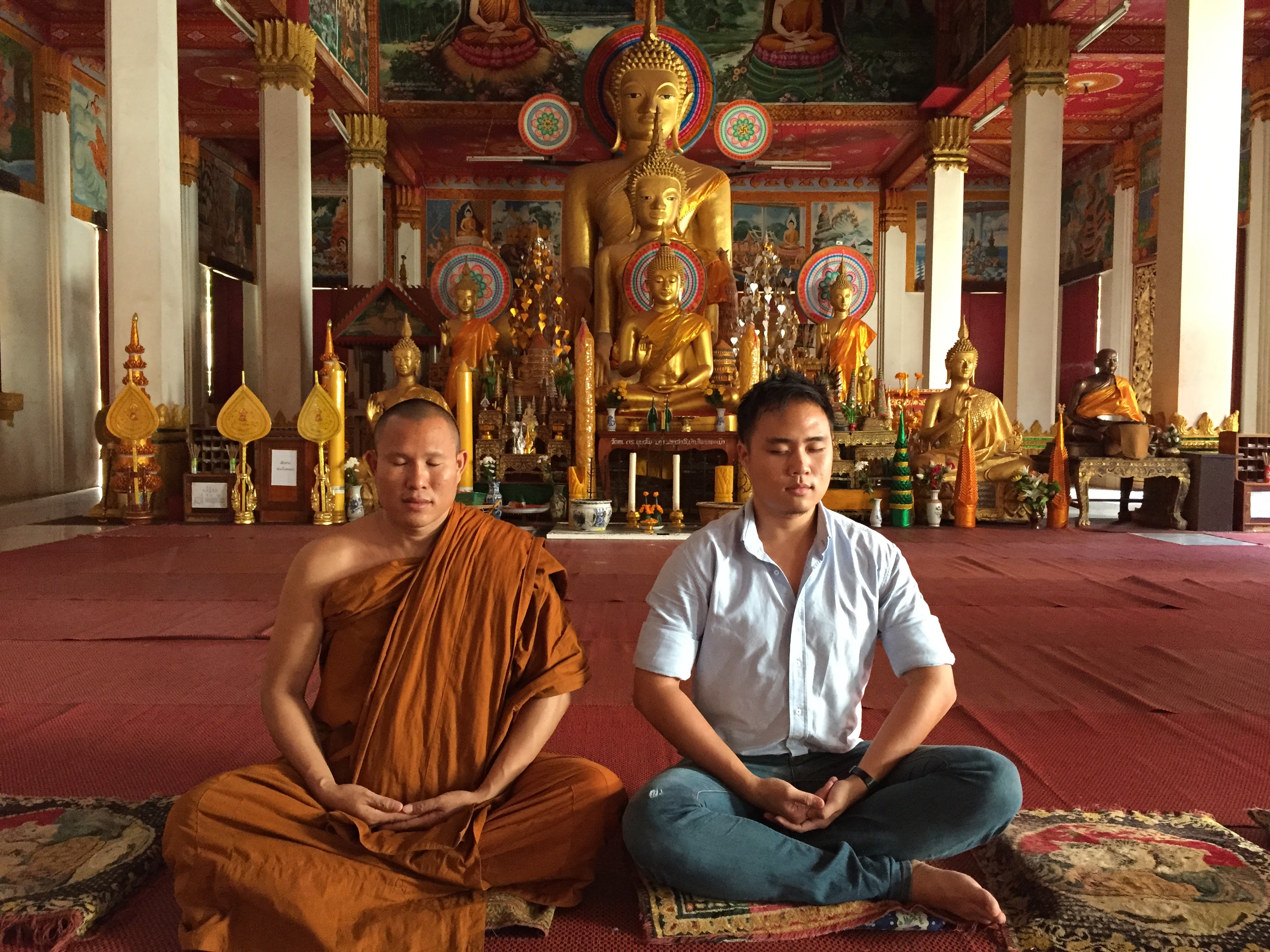If there's one thing Jamon Mok seems to have learned from living, travelling and working all over ASEAN and other parts of Asia, it's that Singapore isn't necessarily the best place to set up a business.
We'll qualify.
Mok has his company's headquarters in Indonesia, which boasts a wealth of talented app developers and designers, and also has established offices in Cambodia, Nepal, Vietnam and Laos — not to mention an expansion into modular, environmentally-friendly and zero-impact housing along the trekking routes of Nepal's Annapurna region.
And what he's doing with Backstreet Academy is ambitious, daunting and what I can only describe as a long-term gamble that isn't clear will pay off, business-wise: encouraging travellers to engage craftsmen and skilled hosts around the region and participate in immersive local experiences.
These could range from learning how to make a Gurkha khukuri knife:
To wood, stone carving or even fishing in Siem Reap:
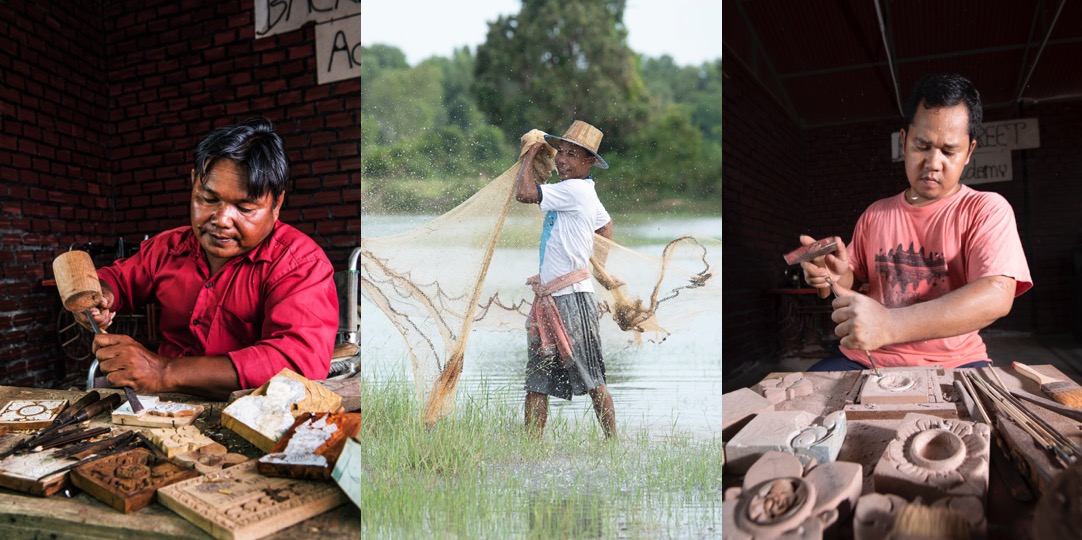 Photos courtesy of Jamon Mok, Backstreet Academy
Photos courtesy of Jamon Mok, Backstreet Academy
Or going back to Kathmandu in Nepal, you could try cooking, painting or an, ahem, food tasting:
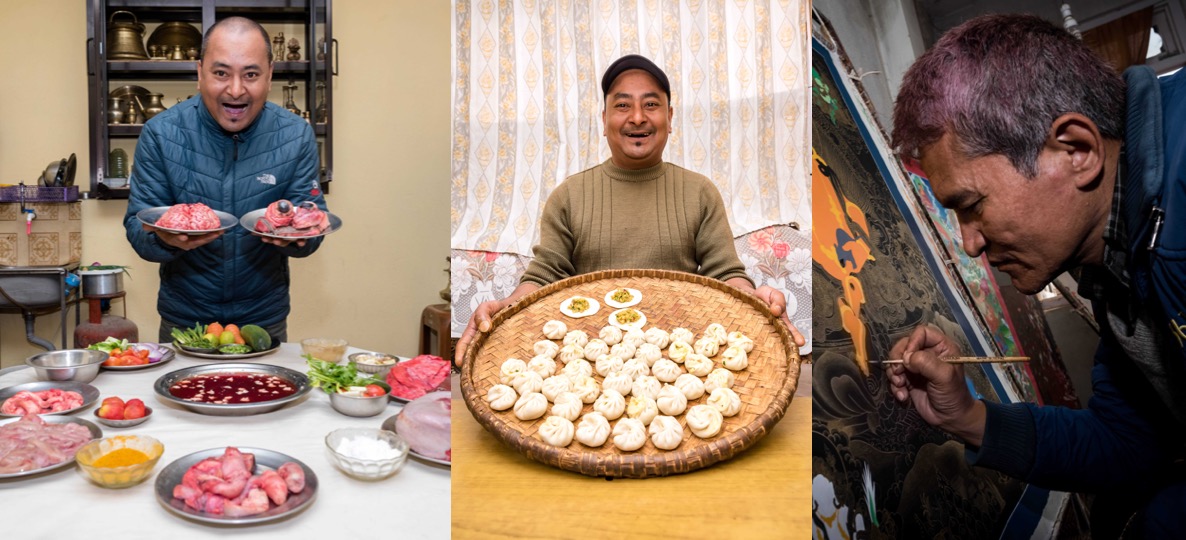 Photos courtesy of Jamon Mok & Backstreet Academy
Photos courtesy of Jamon Mok & Backstreet Academy
These, and more than a thousand others, are done in what he calls a "no negative impact" manner.
This means the experience is beneficial to locals and their surrounding community, revenues are shared in an equitable fashion between all the people involved (transport, interpreter, of course the host him or herself, and Backstreet Academy) and it is also environmentally-friendly, doesn't harm animals and basically, doesn't do harm to anyone or anything.
But the 30-year-old prefers to call it a long-term strategy instead.
"I guess it takes time and it's okay because we will just slowly influence people... because I guess the general population is not that interested in it as well yet, but I guess it will take time.
For sure it's a long-term strategy, but I don't think it's a gamble. The business might be a gamble but I think this initiative has already reaped rewards."
We sidetrack, though. Backstreet Academy now has a total of 21 staff, including himself, Anil and Akash Gurung, his two Nepalese co-founders, and he is still its only Singaporean.
Most of them are from the countries his offices are based in, such as Indonesia and Cambodia, but he also has a Russian, and American and a Dutch in his employment.
Running a zero-negative-impact company
So why, I asked, isn't Mok tapping on all the good things Singapore has to offer — easy business registration, knowledge centres, information hub, insert more buzz words I might have missed out?
The answer to this question lies in the origin story of Backstreet Academy.
Mok explains that when he backpacked in the region while still a business undergraduate at the Singapore Management University (SMU), he found himself outraged at the poorer conditions many of our neighbours live, work and play in.
Inspired by the determination some of the locals showed in eking out a living, circumstances notwithstanding, he went through a couple iterations of efforts to help directly fund local entrepreneurs in developing countries in the region (who banks would not lend money for capital to start businesses with), and settled on the business model of Backstreet Academy, which he started work on with brothers Anil and Akash, who were also full-time SMU students.
In the process of setting up shop around the region, though, Mok discovered there was an increasing sense of consciousness about sustainable travel and eco-friendliness, two things that would eventually play a big part in Backstreet Academy's overall business philosophy.
"The 'people' part... that's also our personal mission. That we've seen this before, you've seen people who need help, and the help we can give them, so that's always been the mission when we started Backstreet.
I would think we sort of thought about (the environment) less (when starting out), but then people were starting to talk about it a lot so we had to also conform to it. And we also thought it was something good that we should practice ourselves, so why not. We can do it, why not?
Environment-wise, we feel that everybody has a part to play... So if that's the case, we can also help... by making experiences environmental. It's also like a 'why not?' thing... if you're doing good in terms of experiences, we don't want to be doing bad and hurting the environment."
And that's how Mok's vision of how he and his co-founders would and should run their company: without having any negative impact, whether it's to animals or to people or to the environment.
"It definitely costs us revenue, for example not selling elephant experiences or things like that. But I think long-term wise it's a necessary move, and if you don't do that, elephant experiences, you do something else.
So it's more important to be right than looking at the short-term gain."
Singapore, behind our neighbours?
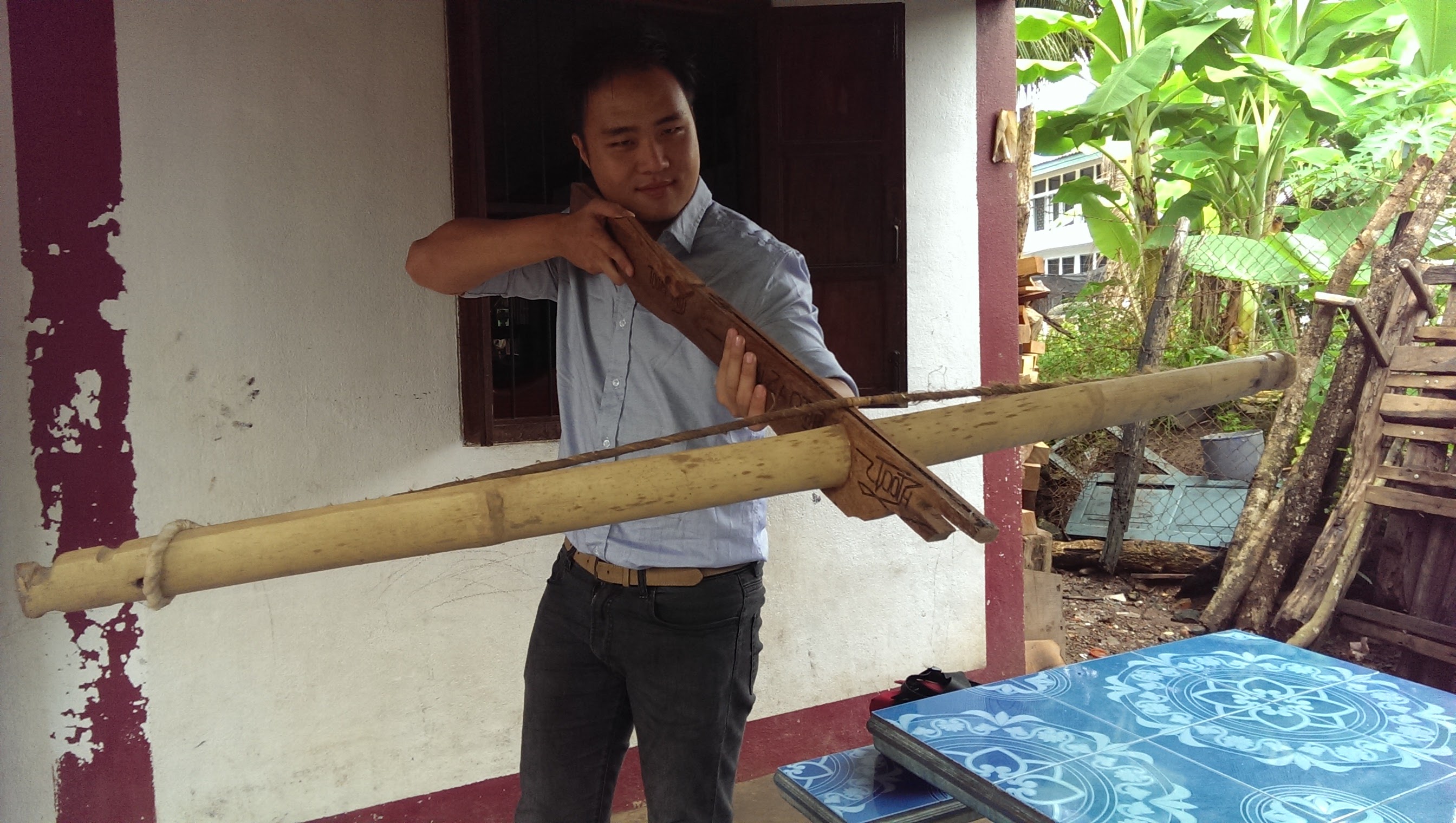 A crossbow made from all-natural material. Photo courtesy of Jamon Mok
A crossbow made from all-natural material. Photo courtesy of Jamon Mok
It was also through operating Backstreet Academy in the region that Mok realised our neighbours in a number of ways do a far better job in being environmentally-conscious than us.
He points out that Laos, for instance, has made the use of bamboo straws ubiquitous since about seven or eight years ago, quite long before environmentally friendly straws started popping up here in Singapore.
In Siem Reap, about 70 businesses that include hotels, hospitals, cafes and restaurants came together to be part of an initiative called RefillNotLandfill, in which they all agree to stop selling or giving any beverages in plastic disposable bottles, but instead sell reusable bottles and give water at distribution points for free refills anytime.
Mok acknowledges that there are many efforts in this regard in Singapore too, many good and meaningful ones at that, but notes that they tend to "die down" after awhile because they're quite decentralised, and it's more difficult to organise industry-wide efforts compared with smaller cities in our developing neighbour countries.
"There's a bigger proportion of NGOs, social businesses, and there's a bigger community of them in developing countries. So in bigger cities like Singapore, even though you have a lot of these businesses, they are not concentrated, they don't come up with industrywide initiatives. Whereas in Siem Reap, it's so small, everyone knows each other, so it's very easy to create something like that."
And it isn't (completely) because the government isn't supportive
Is it because these efforts are buoyed by a supportive government?
Not really, says Mok, who immediately observes that the governments around our region aren't exactly falling over themselves to pass laws to ban plastic straws or single-use plastics.
That being said, he notes that legislation to ban single-use plastics has worked in Europe, where for instance, a study found 30 per cent fewer plastic bags in the waters off Norway, Germany, northern France and Ireland.
"The government has certain roles to play and they should. They don't have to take up the entire role but nudges from them are very important... so it's not something we can't do, we can easily do that."
Mok does have confidence that the Singapore government will see that at some point, it has to be done for the betterment of our society.
"All companies should become social enterprises, one way or another"
And here's where a good dose of idealism creeps in: Mok boldly says to me that every successful company in the near future will have to show that they are making a positive impact on the world — and that they're not causing harm to it either.
"I think it's unsustainable to think about growth (without doing this ethically) because it'll come and bite you at some point. I feel that in the near future, five to 10 years' time, or 20 years' time, all companies should become social enterprises, one way or another.
They cannot be seen to be just making money anymore at some point. Every big company will have, even if it's greenwashing, they will say they have some impact, everyone will start saying they have some impact. Whether they have or not is another thing. Whether they really have is another thing but everyone will start saying they are doing good in some way or another.
Because consumers do demand it, and now we are at a point where you still don't need to say you are a 'good' company with a social mission, but if you are doing something negative, it really bites you badly. So it starts with a negative part, and slowly people will need to show that they have something good for the community."
I do see some validity to this — companies get called out all the time for unethical or exploitative practices, whether the things being exploited are people, animals or the environment.
The uphill battle: getting people interested in sustainable travel
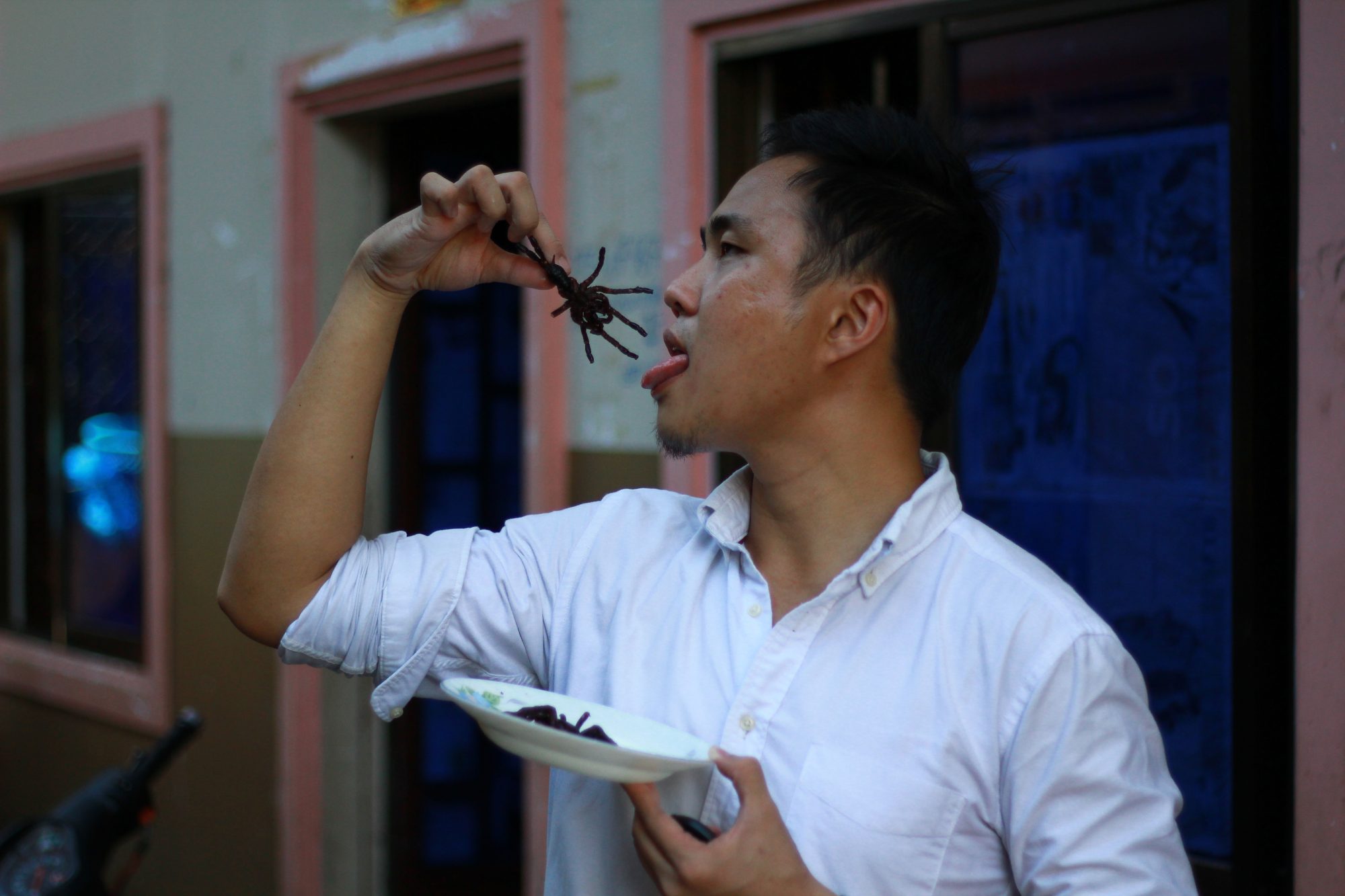 Eating a tarantula. Photo courtesy of Jamon Mok
Eating a tarantula. Photo courtesy of Jamon Mok
But, as he admits, it's a bit slow these first few years, and the struggle to get Asian travellers interested in sustainable travel within our region is real.
It's a hard-sell for reasons Mok is well-acquainted with: trips we take around the region are shorter, our eyes are glazed to the sight of ethnically-styled fabric, traditional carving and art, and in general, we don't go on holiday to experience hardship (or what we may perceive as that); we look for Instagrammable luxury.
"I think most people still think of sustainable travel as something that is totally overpriced — you go there for a photo op, you do something that you can talk about, but not necessarily fun, and then that's it.
But I think it can definitely be very fun, very authentic, something that can be so memorable, Instagrammable that you will go back and talk about it. And in the future when you travel again, you will actually look for such experiences."
So he's biding his time — since December last year, Mok started an ambassadors' programme, where he sponsors travel bloggers and influencers from all over the world to participate in some of Backstreet Academy's experiences, in exchange for reviews about them.
There are now some 70 people on this list (only three influencers from Singapore, by the way), and they receive small commissions on sign-ups from people who discover Backstreet experiences through them.
Mok tells me he's targeting an eventual size of 500 ambassadors eventually, but in the meantime, he's content with small increments and authentic, meaningful reviews, which he feels will make a greater impact on people looking for these types of travel experiences.
And certainly, he's banking on his long-term strategy of more and more travellers thinking in this way, and looking to do good through their holidays.
How long it'll take is an open question, but it looks like he's prepared to wait.
"I think people just need to do it, and people just need to talk about it more. At some point, there will be a tipping point."
Top photo courtesy of Jamon Mok
If you like what you read, follow us on Facebook, Instagram, Twitter and Telegram to get the latest updates.
